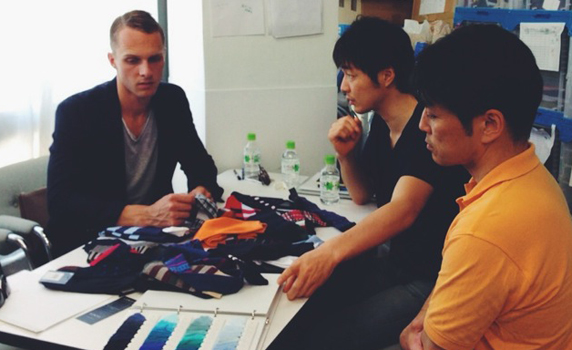
Hamburg, Barcelona and Tokyo. These are the three cities between which Martin Axnick (MBA 2013) splits his time. Originally from Germany, he began his adventure as an entrepreneur whilst pursuing a master’s degree at IESE. He now travels frequently to Japan to visit the manufacturers of EIKYU (in English “forever”), his newly released premium men's clothing brand that embraces the "made in Japan" label.
The idea behind EIKYU is to produce basic, everyday apparel, which is elegant, comfortable and minimal in design, yet also stands out for its quality materials and artisanal production. The company distributes its apparel primarily through its website and selected partner stores worldwide.
After seven years of training in the United States, Martin returned to Europe and began working as a consultant for A.T. Kearney. It was a very enriching experience, he says, but after three years he decided it was time to refocus his career: “I knew I wanted to do an MBA in Europe," he explains. "So, I said: there are only really two options for top-rated programs in Europe, and one was obviously IESE."
What swayed his decision? According to Martin, the factors which convinced him most were the curriculum which was "an extremely good general management education,” and the structure of the program, which was spread over two academic years. He also credits the influence exerted upon him by some former colleagues at A.T. Kearney, who had also chosen IESE in Barcelona. We suspect that the idea of settling down for a reasonable period of time in this temperate and cosmopolitan Mediterranean city also had something to do with it, though.
A change of direction
When Martin arrived at IESE, entrepreneurship was already on his radar. Whilst he was also intrigued by the area of venture capital, he soon decided that he would start his own company either during the master’s program or straight after it. Martin knew he would be very busy during his first academic year. But he thought he could take advantage of holiday time off and, above all, of the second year, in order to develop the idea of becoming an entrepreneur.
So he did just that. "During the Christmas break, I told myself, 'Look, I’m not going to do any more interviews.'" Martin, like the rest of his classmates, had participated in recruiting fairs organized by IESE in the first semester, and had several interviews with recruiters for top firms in the consulting, banking and consumer goods sectors. But the time had come for him to firmly resolve to start his own business.
A conducive environment
Martin wasn't the only one on his program with such aspirations. He says his classmates would often engage in dialogue and discussions on the topic; what kind of innovative business models and start-ups were being founded in the United States and Europe? Which ones were able to secure funds and why? What type of approaches did the successful entrepreneurs take? The students put themselves in the right frame of mind, and gradually "awakened" the entrepreneur within.
Among the group was a Japanese classmate, Takemune Iwasa, with whom Martin had connected from the first day. Together they began to develop the EIKYU concept, traveled to Japan to visit the workshops that would become their suppliers, and founded the company — based in Barcelona with offices in Hamburg and Tokyo. Now they are embarking on a new journey: building a global men’s apparel brand.
The business model
The idea of launching EIKYU arose from its creators' own needs for durable and comfortable quality men’s clothing. Worlds apart from the concept of fast fashion, the EIKYU model follows in the footsteps of those selective brands that have made it big on the Internet, such as Bonobos, Everlane and Orlebar Brown.
However, Martin and Takemune aim to distinguish their brand from the rest, which is why they give such importance to the heritage and production of their clothing. According to this entrepreneurial team, professional experience and attention to the smallest detail by the minimalist Japanese artisans with whom they work make this process very difficult to imitate.
“The idea, from the beginning, was to build a brand with a well-defined concept of product, and to outsource production to the best manufacturers in Japan. EIKYU offers customers a unique product and a convenient online shopping experience," explains Martin. That said, they will likely evolve, as other online brands already have done, toward a mixed model that combines website-based sales with an offline presence at some carefully chosen points of sale. They will look to achieve this by seeking agreements with the most prestigious retailers (the likes of Nordstrom, Harrods and Neiman Marcus) or by selling their products in selected stores.